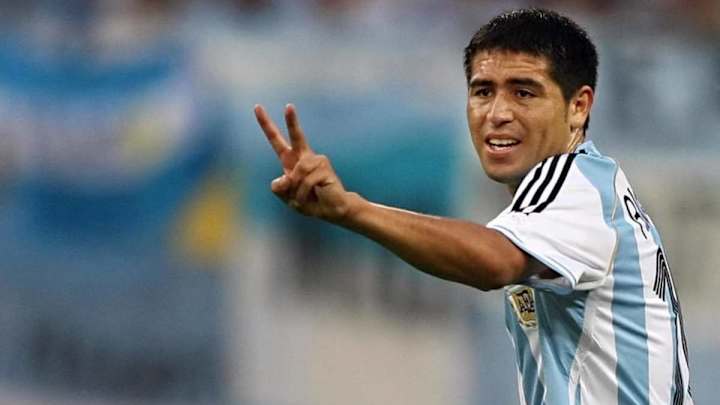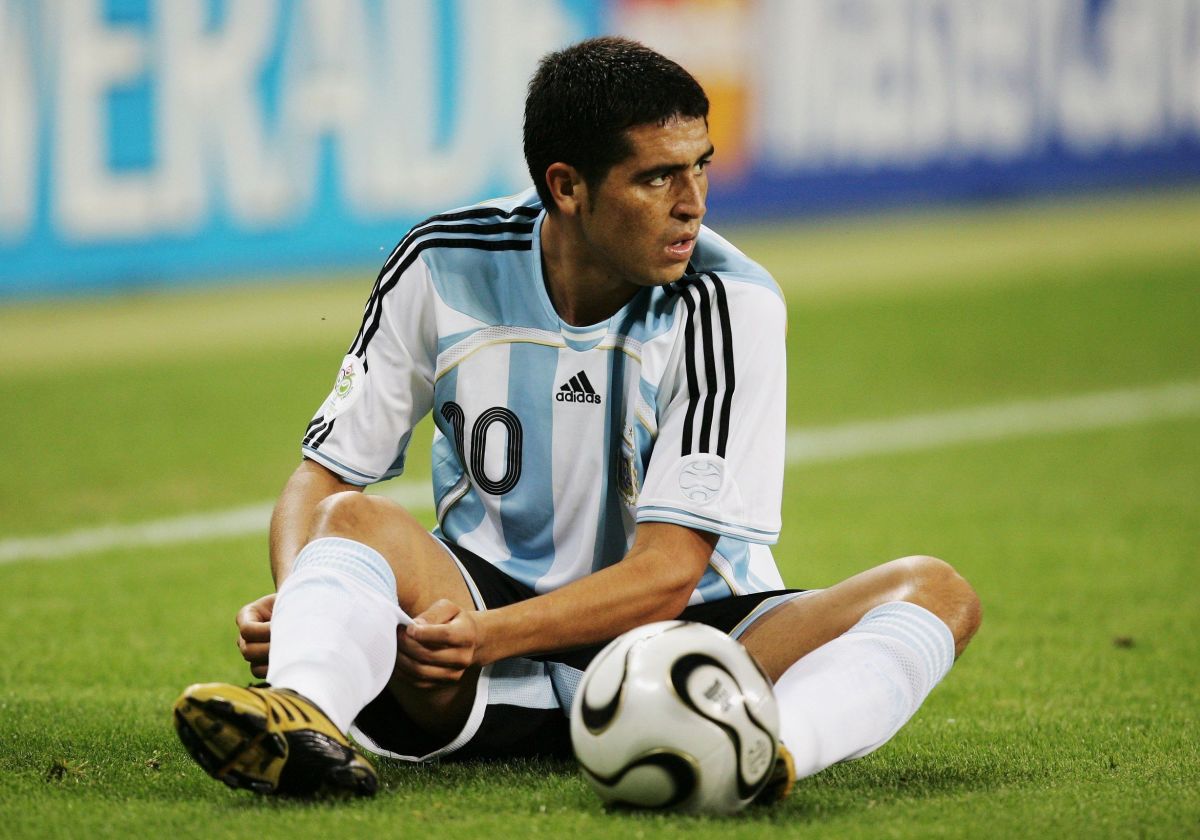World Cup Countdown: 1 Day to Go - What if Juan Roman Riquelme Hadn’t Been Substituted?

Decisions, decisions, decisions. A defining trait of any great leader is the ability to make the right decisions under pressure. Take Neil Armstrong, for example. As the commander of Apollo 11 he was responsible for guiding the Lunar Module to the surface of the moon. After having overshot the planned landing area (through no fault of his own) he searched for a safe place to land, the fuel in his spacecraft plummeting as he sped past fields of boulders. Armstrong had only moments to decide whether to abort the mission, or to attempt to land; he opted for the latter and, as we know, arrived unharmed. But when he touched down there were only ten seconds of fuel left in the tank.
In the 2006 World Cup quarter-final, with only 18 minutes of normal time remaining, Argentina led Germany by a goal to nil. Their coach, José Pékerman, decided to protect his side’s lead by taking off the team’s enigmatic playmaker, Juan Román Riquelme, and replacing him with Esteban Cambiasso, a much more defensively minded player. It would turn out to be a terrible decision.
Few quibbled when Argentina were selected as one of the eight seeded teams in the draw for the 2006 World Cup. They’d reached the tournament with ease, finishing second in the ten team South America qualifying group on goal difference.
The creative heart of this Argentine side was Juan Román Riquelme, a classic number 10 who could tear apart the tightest of defences with a perfectly weighted pass. But this was no one-man team. Argentina’s defence was patrolled by the peerless Roberto Ayala, Javier Mascherano toiled alongside Riquelme in midfield, while Hernán Crespo and Carlos Tevez were strikers of the highest order. Leading them was José Pékerman, a respected coach who had taken the Argentinian Under-20 side to three FIFA World Youth Championship triumphs between 1995 and 2001; victories secured with a host of players that had now graduated to his 2006 World Cup squad.
Fate may have blessed Argentina with a golden generation of talent, but it didn’t appear to smile kindly on them when the draw for the group stage was made. Every World Cup has a ‘Group of Death’ and in 2006 Argentina had the misfortune to be drawn into it. They would have to take on a Netherlands side that boasted a fearsome front three of Robin van Persie, Ruud van Nistelrooy and Arjen Robben, a Didier Drogba inspired Ivory Coast and Serbia and Montenegro, who had qualified for the tournament ahead of Spain.
Can’t believe this Genius is going to be 40 in two weeks. What a player Riquelme was pic.twitter.com/n6d9sfzKJ1
— Scot Munroe (@scot_munroe) June 10, 2018
Pékerman’s side opened against the Ivorians, who started the match strongly but were powerless to prevent Argentina from racing into a two goal lead by half time. Both goals were created by Riquelme, the first coming from an exquisitely delivered free kick and the second from the type of defence-severing pass that he had built his reputation on. Drogba got a goal back eight minutes from time, but Argentina held on for the victory. It was a good start, but what really made the world sit up and take notice was Argentina’s subsequent thrashing of Serbia and Montenegro, and one of their goals in particular.
The Argentinians took the lead after only six minutes of play, but it was their second goal that marked them out as potential champions. An uninterrupted sequence of 24 passes befuddled the Serbian and Montenegrins, whose pursuit of the ball was as fruitless as it was entertaining. Cambiasso eventually applied the finishing touch but, perhaps more than any other goal in the history of the World Cup, this was a goal scored by a team. Another goal followed before half time and Argentina then got another three in the second half, running out 6-0 winners. The South Americans appeared to be unstoppable, but timing is everything in a World Cup and events would eventually show that Argentina had peaked too soon. Their final group game against the Netherlands was highly anticipated but, with both teams having already qualified for the next round, there was little to play for and a dull 0-0 draw ensued.
Argentina’s opponents in the round of 16 were Mexico, who had struggled to make their way out of a weak group containing Portugal, Angola and Iran. The Mexicans surprised everyone, and perhaps even themselves, by taking the lead after only six minutes. Argentinian nerves were calmed four minutes later, however, when Borgetti headed the ball past his own goalkeeper from a Riquelme corner; a goal which, mystifyingly, would later be credited to Crespo.
Román, siempre Román y toda la vida Román. pic.twitter.com/epAMPg9FXI
— Riquelme Pics (@RiquelmePics) June 6, 2018
An absorbing game followed that was eventually settled in extra time by a superb volley from Maxi Rodríguez, a strike as spectacular as Cambiasso’s goal had been impressive. Next up were the hosts, Germany, who were performing better than the results of pre-tournament friendlies had indicated they would. Most importantly, Jürgen Klinsmann’s side were scoring goals for fun, notching ten in their victories over Costa Rica, Poland, Ecuador and Sweden. But whether they could score against an opponent of Argentina’s calibre was another matter.
The eagerly anticipated quarter final took a while to get going, with the first-half producing little by way of goalmouth drama. The second half was only four minutes old, however, when Argentina finally broke the deadlock; Ayala heading the ball into the net from a Riquelme corner. The Germans sailed forward in an attempt to find an equaliser, but the South Americans held their lead, Pékerman eventually making the fateful decision to substitute Riquelme in favour of Cambiasso.
In fact, Pékerman made a host of decisions at that point. Not only did he decide to withdraw his playmaker, he also chose to replace him with a defensive midfielder rather than with another potential match winner. And Pékerman wasn’t short of options in that regard, for on the bench were Javier Saviola, a quicksilver striker, as well as a precocious teenager called Lionel Messi. The Germans soon punished Pékerman for his cautiousness; Miroslav Klose heading them level just eight minutes later. Riquelme’s presence on the pitch may not have prevented the equaliser from being scored but, crucially, he was no longer available to inspire a comeback.
The tie went into extra time, but neither side could find a way past the other and so it had to be settled by penalties. Both nations had competed in three penalty shootouts in previous World Cups and had won every time, so something would have to give, though history did give a clue as to the likely outcome. Of the 14 penalties previously taken by both sides the Germans had missed only one, compared to Argentina’s three.

Perhaps predictably, therefore, it was the Argentinians that blinked first. The hosts scored from each of their spot kicks, but first Ayala missed for Argentina and then Cambiasso, scorer of the wonder goal that had made them the favourites, had his strike saved by Jens Lehmann. The drama didn’t end there as a brawl broke out on the pitch as the Argentinians struggled to retain their composure in defeat, unused substitute Leandro Cufré later being given a red card for kicking Per Mertesacker to the ground.
Just as with Brazil in 1982, the neutral’s favourite team had been eliminated at the quarter-final stage, leaving the World Cup a lesser event without them. Germany’s tournament didn’t last much longer either, with the hosts succumbing to the eventual winners, Italy, in the semi finals; a team that Argentina could surely have beaten. Pékerman soon announced his resignation and Argentinian supporters were left scratching their heads, wondering how the team that were supposed to have won the World Cup now didn’t even have a manager.
The Germans have continued to be a thorn in Argentina’s side ever since, beating them in the quarter-finals of the 2010 World Cup and then again in the final four years later. Who knows, perhaps 2018 will finally be the year that Messi flies his fans to the moon. If he does, then Jorge Sampaoli will have demonstrated that Argentina finally has a coach who possesses the right stuff.

Simon Turner is the author of ‘If Only: An Alternative History of the Beautiful Game’ published by Pitch Publishing. You can follow him on Twitter at @simonaturner100
